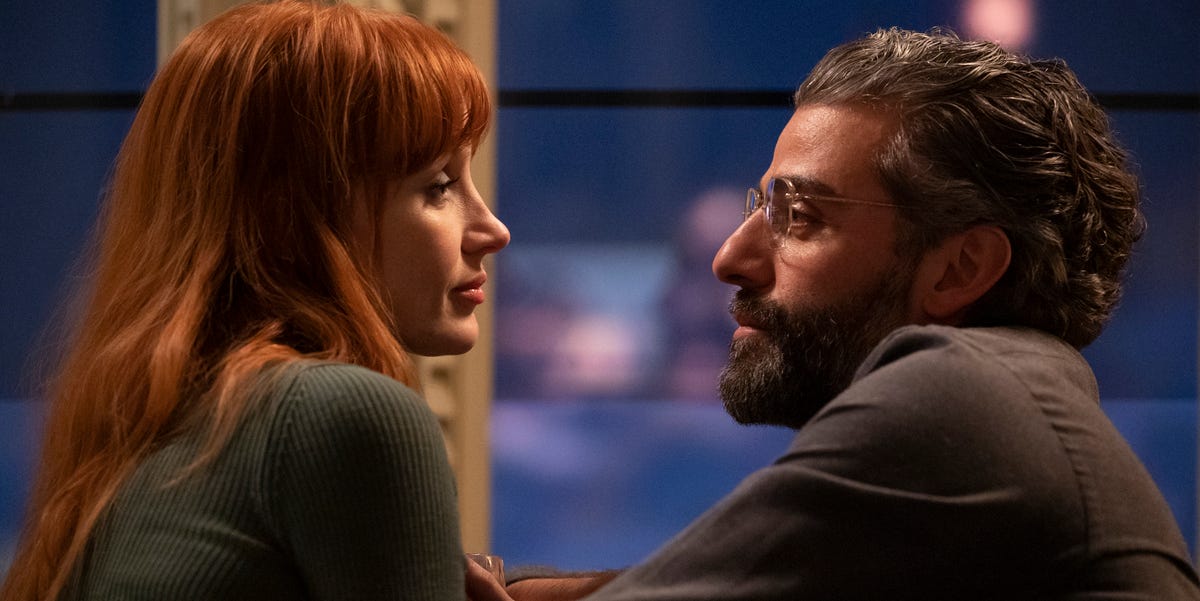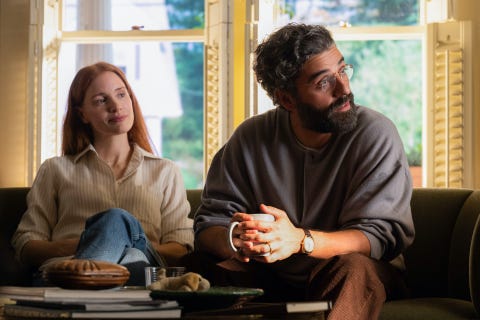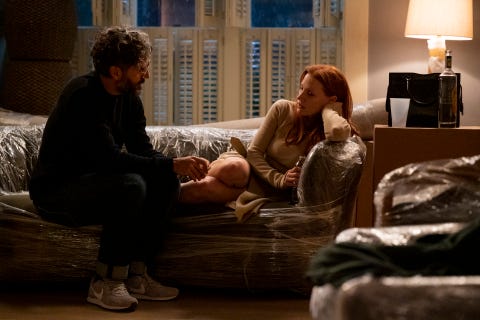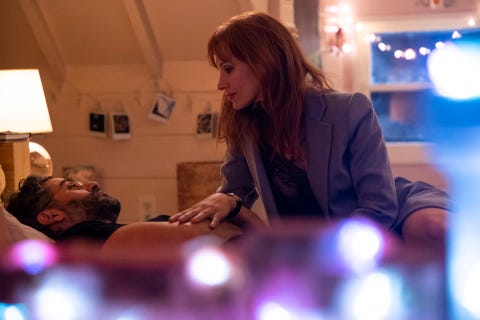Products You May Like
When it comes to marriage, there’s little that hasn’t already been said, written, sung, painted, or filmed. Yet there remains perhaps no greater source material for modern entertainment. Union—how we nurture it, abuse it, worship it, and lose it—is an endlessly moldable subject, a fact Hagai Levy, director of HBO’s Scenes From a Marriage remake, used to his advantage. He had little doubt he could shape something new from the clay of the celebrated 1973 original, starring Liv Ullman and Erland Josephson. He only needed to find the right reason.
Levy’s version follows many of the same beats as Ingmar Bergman’s masterpiece, which saw a couple, Marianne and Johan, through 10 years of marriage and, eventually, into a heart-wrenching divorce. At the time, the miniseries was a bitter shock to Sweden; it’s widely credited with spiking divorce rates throughout the country soon after the sixth and final episode aired.
In some ways, Levy’s HBO series is an answer to that reaction: The show examines how we now, decades later, have redefined the intermingling of marriage, satisfaction, work, gender, sex, and devotion. The show asks what has changed—and, most importantly, what has not. With small but essential tweaks to Bergman’s premise, Levy and his co-writer Amy Herzog have created a standalone story, one that shows reverence to its roots while posing different questions for a new era.
Nowhere is that more clear than in the casting of Mira and Jonathan, the new Marianne and Johan. In these gender-flipped roles, Jessica Chastain and Oscar Isaac give the Juilliard-trained performances of a lifetime, with deftly subtle but magnetically raw movements and intonations. Mira, not Jonathan, has a thriving career. Mira, not Jonathan, wants an abortion. Mira, not Jonathan, cheats on her spouse and leaves her family. Perhaps such a gender shift shouldn’t feel dramatic in 2021, but it’s hard to deny it does. Scenes From a Marriage works because it plays with your expectations, with the progressiveness and maturity you thought you’d developed.
Now that the fifth and final episode has aired on HBO, Levy and Herzog are finally able to reflect on the creative choices they’ve made, and why those changes helped them pull off a nearly impossible Hollywood feat: a masterful reboot. Below, the director and writer walk us through the ingredients that made Scenes From a Marriage, and how they coalesced into a momentous—and meaningful—finale.
On why now was the right time for a remake:
Herzog: We [had] met a few times and started talking about the original, in a gentle, entry kind of way. Trying to surround what it was, what it meant at the time, what we both loved about it, and what our entry point might be for looking at it again. Hagai had this feeling that he wanted to do it again…It was like he was haunted by it, without knowing exactly what the end game was. We had floated the possibility of the gender switching, but we hadn’t landed on one story definitively. And then, at some point, I think it became clear to him that that was what he wanted to do.
Levy: The question is not exactly why to remake it, but if you have a good take on it. When I felt that I had a new point of view on the whole thing, then it became a very interesting exercise.
On why gender-flipping the protagonists was an intriguing premise:
Levy: In the beginning, it was about my resentment of the main two characters in the original. When I came to work on [this show], I realized that actually I didn’t like [Johan] at all. He’s a chauvinist pig; he’s cold. I mean, he’s a character that we are not supposed to feel something for. And [Marianne], putting a woman on screen who was so weak and dependent is something that is hard for me. So that was the main motive to flip the [genders]. I started [realizing] immediately that this is the take I needed to do with this series. It’s a very interesting gender study, and it modernizes it immediately.
Herzog: There is so much that, on the surface, has changed about marriage, and about heterosexual relationships, and about women’s ability to occupy the professional sphere. Things that were kind of shocking when the [original] series was made in 1973 are not shocking now. One thing was like, How do you tell the story in a way that honors the original, but also creates some of the force of surprise of the original, now that so many of those things have become more commonplace?
There was something about it being the woman who leaves [the man]. She doesn’t say, “I don’t care what happens to my child over these next several months,” but she makes a decision that, even now, in America, is a taboo to say: “I’m going to follow my passion, and motherhood be damned.” That was a really big part of it.
Even a more personal thing, for me, is that there’s this way that feminism in a certain milieu encourages women to try to imitate the lives of men, or to try to claim for ourselves the things that men have, without answering the question, “Are those things sort of moral or spiritually positive to begin with?” [By the finale], Mira may have lost a tremendous amount over the course of this series, but something that she has gained is a kind of insight that she was so far from in the beginning, when she was so blinkered and so caught on a treadmill of desire.
On Isaac and Chastain’s electric chemistry:
Levy: I had Jessica in mind [for the role of Mira] for some years. She wasn’t available, so I cast another actress, but then suddenly [Chastain] was available. That was really a dream come true. It was a miracle for me that, suddenly, a month and a half before shooting, circumstances changed in a way that I could get her.
Oscar, I met him in New York a year ago, and I immediately felt his passion for the project. And I have to say that Oscar [from the beginning] wanted Jessica in that role. So when suddenly we got her, immediately everything changed. The chemistry was all from the first moment. It was so immediate on the first day. Really, it was just unbelievable.
Herzog: What we knew about them for sure is that they’re both these extraordinary kind of athletes. They’re theater actors. They’re trained at Julliard. They can do a 29-minute take four times in a row without blinking. They never miss a line. They are bringing it every time. They’re bringing it when they’re not on camera, for each other. You know? I mean, all of that became even more apparent and more incredible to me as I worked with them. But we knew we were working with people who had this extraordinary capacity. That gives you a lot of freedom as a writer.
On the decision to show Isaac and Chastain interacting as themselves before each episode:
Levy: It’s so interesting because there [have been] so many different interpretations of [that decision]. Everyone felt differently, which is good. It was a very instinctive decision, a very intuitive decision—just a month before shooting or less. It wasn’t in the script. It just was an instinct when I saw them, and I saw their chemistry. And I saw them as human beings and started to know them. Something felt to me that I needed to say, “This [story] is about something beyond just this couple.” It’s more abstract than that.
On including the abortion scene in the first episode:
Herzog: It was something we thought about and went over and over a lot, because it’s so loaded, and because my politics dictate that, if I’m going to write an abortion scene, I’m going to want to write a really happy abortion scene. I don’t want to put a portrayal out there that someone can argue, “Look, they made a mistake.” On the other hand, I think that women should have the right to do whatever they want with their own bodies. And I think women should have the right to then have whatever feelings they want to have about it. So, something that was important to us was that, unlike in the original, it’s really Jonathan who wants this baby and Mira who doesn’t. I think that’s something we don’t see a lot. And I think it’s really real.
In the original, the abortion has this extremely clinical sort of patriarchal feeling. I wanted to capture the reality of this kind of healthcare, which is that a lot of the people providing care are women, and the environment is pretty warm. That has its own kind of drama to it: You’re in a warm and casual relationship with a provider while making a decision that might feel really loaded, and in some cases really painful.
On telling a story about divorce in 2021:
Levy: Maybe [I wanted to revisit this story now] because divorce has become so easy, maybe unbearably easy. I think I wanted to say something about how hard it is to get divorced. I think the culture is really promising us, go after your heart, just be free to feel. All these promises are very nice, [but] I think this [story]’s about how painful it is, how hard it is, how problematic it is to get divorced. What was important for me was to put this mirror in front of the culture, where [divorce] has become almost like something everyone does.
On the finale, and why Mira and Jonathan come together again:
Herzog: The biggest change we made from the original is that, in the original, both Marianne and Johann are married to other people and are cheating on their spouses with each other. And in ours, Mira is single and she’s not cheating. She’s cheating at sort of…She’s cheating on her contract with herself to be alone. That felt important to me as a change from the original, because I think it’s a choice so many women are making, to be alone and to not be bound to a man who requires a lot of care.
Levy: I wanted them to get to a point in life where they can be with each other in a more free way, a more honest way. They’ve been through the war; they know now how they can communicate [without] the institution of marriage. The fear of losing the institution, the fear of losing the barrier, it’s not there anymore—because they lost it already. So, that makes them really in a different place where they can really love and see each other.
This interview was conducted over two separate conversations and has been edited and condensed for clarity.
This content is created and maintained by a third party, and imported onto this page to help users provide their email addresses. You may be able to find more information about this and similar content at piano.io



